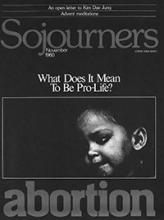First Sunday in Advent
Matthew 24:36-44
Jesus' story of the people working in the field, one of whom was taken and the other left, has often been a touchstone of traditional spiritualities, particularly of the "that's incredible" variety. Most are otherworldly and focused on a Jesus who appears to bear the passkey to an otherworldly kingdom of God.
But there is afoot another spirituality that also draws life from this passage, one that is firmly rooted in human life and is responsive to the needs of our times. People who practice it tend to stress the real, historical Jesus and his behavioral as well as verbal announcement of the kingdom. For these people, Jesus' call to be alert and watchful for the coming of the Son of Man is a call to a way of life sensitive to God's active work of deliverance for the people of this world. Such a spirituality requires them to scan the horizon incessantly, watching for signs of renewal, for evidence that the suffering are rising up to new life.
In some parts of the world it's hard to miss the signs of God's work among people. When the Nicaraguans finally expelled General Somoza and established their own government, they agreed to ban the death penalty in their own country, choosing to build on life rather than revenge. They even agreed to pay General Somoza's debts to the foreign banks and governments that had supported him with loans. Surely the spirit of God was at work somewhere in Nicaragua to instill the spirit of forgiveness and integrity in people who had known decades of suffering at the hands of their old ruler and his powerful allies.
Read the Full Article

